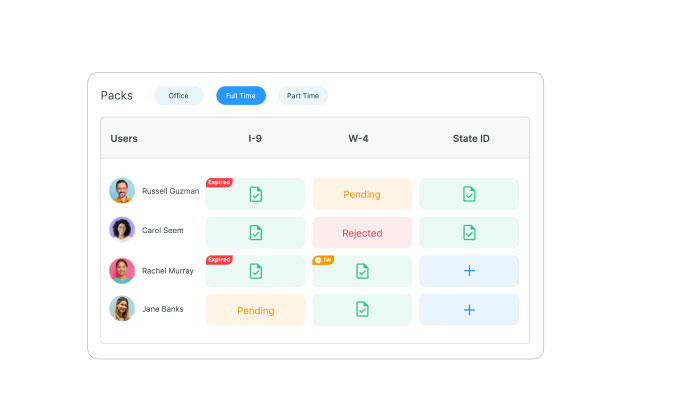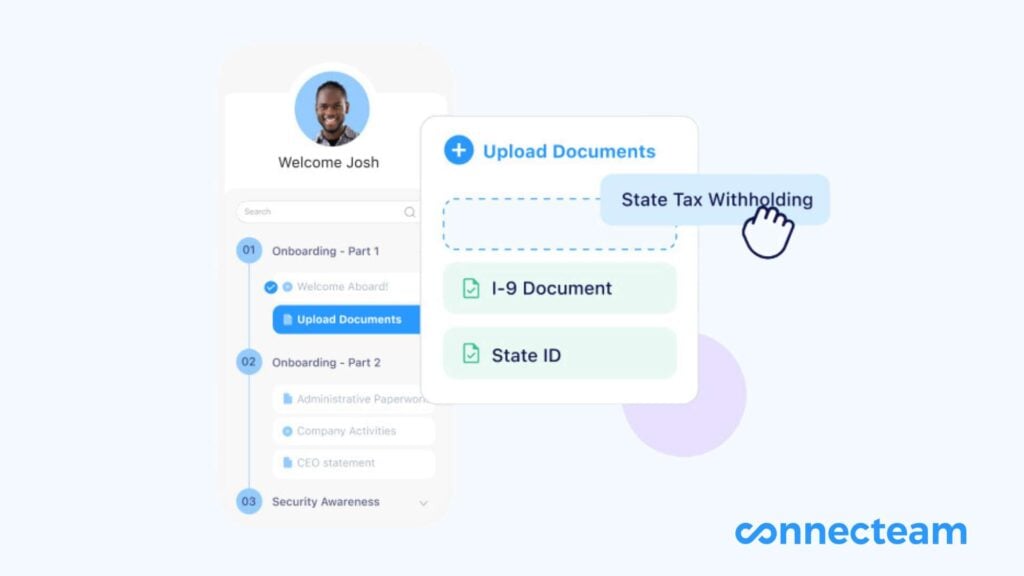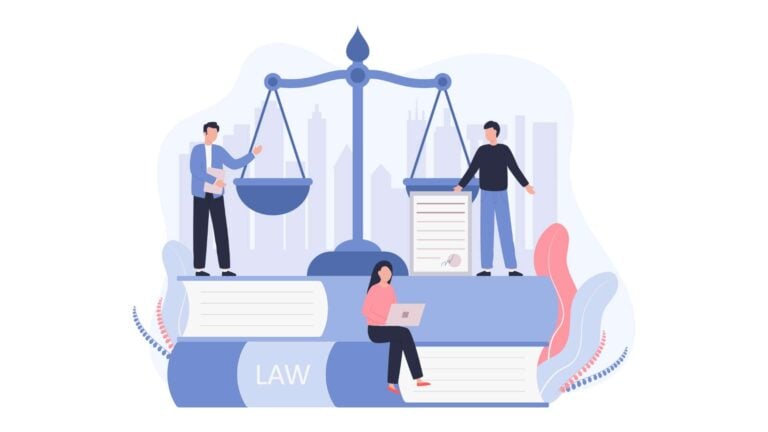Various states have laws addressing employee access to personnel records—including whether employees can view and copy their documents and what steps the employer must take to facilitate access. In this article, we explain these laws to help you understand your obligations as an employer and minimize your risk of non-compliance.
As an employer, knowing when and how your employees are legally entitled to access their personnel files lets you develop a clear policy on the issue. It also ensures you stay compliant with the law. Otherwise, you risk facing financial penalties or even a lawsuit.
While no United States federal law addresses employee access to personnel records, various state laws apply. However, it can be difficult to understand the ins and outs of these state laws and what they mean for you as an employer.
To help you, we’ve put together this guide explaining state personnel file laws that apply to private employers. We include information on employee rights, employer obligations, and potential penalties for non-compliance. Plus, we share effective ways to store and organize personnel files at your company.
Key Takeaways
- There are no federal laws addressing employee access to their personnel files. However, various states have personnel record laws, and there can also be laws and regulations at a municipal level.
- These laws regulate issues like who can inspect and copy a personnel record, the conditions of inspection, and penalties for non-compliance.
- Many US states don’t have personnel file laws at all. These include Alabama, Florida, New York, Ohio, Texas, Wyoming, and more.
- It’s important to know whether these laws apply to you and understand your obligations as an employer to avoid the risk of fines or lawsuits.
- Using software like Connecteam can make storing and organizing personnel files at your company much easier.
What Is a Personnel File?
A personnel file or record, also called an employee file, is a collection of documents and records relating to a worker’s employment at a company. Employers maintain these files for legal and administrative purposes.
Personnel files may contain documents and information like:
- The employee’s contact details
- Tax information and forms
- References from previous employers
- The results of any pre-employment background checks
- Employment contracts
- Wages and hours
- Employment history
- Workplace accidents
- Complaints, warnings, or other disciplinary action records
- Client feedback
- Leave records
- Performance reviews
Pro Tip
Employee medical records should always be stored in a separate file. Different legislation applies to medical information storage and who can access it.

Federal Laws on Personnel Files
There’s no one federal law that says employees can or can’t see their personnel files. Because of this, employers often assume that no federal rule means no federal regulations. In reality, that couldn’t be further from the truth.
There are several federal laws that impact how you manage, store, and disclose information in employee records. If you want to stay compliant and protect your business from legal risks, you need to understand these laws.
Here’s a breakdown of the key federal laws that impact personnel files, and what you need to do to stay compliant:
HIPAA (Health Insurance Portability and Accountability Act)
What it is: HIPAA protects health information, and it’s one of the most important federal regulations when it comes to employee records. While it applies mostly to health plans and providers, employers still need to adhere.
What you need to do: Any medical information you get from an employee, like a doctor’s note, insurance details, or medical leave forms, needs to be handled carefully. Even if it’s not technically covered by HIPAA, treat it like it is. That means you need to store it securely and separately from the rest of the personnel file, with limited access.
ADA (Americans with Disabilities Act)
What it is: The ADA prohibits discrimination based on disability, and it comes with strict privacy rules for medical information.
What you need to do: Keep all disability-related documents, such as accommodation requests or medical evaluations, in a separate, confidential file. Only people who absolutely need to see them should have access, no exceptions.
FMLA (Family and Medical Leave Act)
What it is: FMLA gives eligible employees unpaid, job-protected leave for specific family and medical reasons.
What you need to do: All FMLA-related documents (leave requests, doctor’s notes, etc.) should have their own separate files. It’s important to not mix them with general personnel files to comply with both FMLA and ADA requirements.
FLSA (Fair Labor Standards Act)
What it is: FLSA covers wage and hour laws, and has clear requirements for recordkeeping.
What you need to do: Pay rates, hours worked, overtime, and deductions don’t necessarily belong in a personnel file, but they do need to be stored securely and accessible when needed. Even after an employee leaves your company, you still need to keep payroll records for at least three years and timesheets for two years.
Title VII of the Civil Rights Act
What it is: The Title VII law bans discrimination based on race, color, religion, sex, and national origin.
What you need to do: If an employee files a discrimination claim, your documentation can be used as evidence. That’s why it’s critical to keep thorough, consistent records about hiring, performance, discipline, and termination.
FCRA (Fair Credit Reporting Act)
What it is: If you run background checks using a third-party service, you need to comply with the FCRA’s requirements.
What you need to do: Give employees or applicants a copy of the background check and a summary of their rights under the FCRA. If you decide not to hire or promote someone because of the report, you need to notify them with a formal notice. You should also keep the background check information in a separate, secure file.
Why Would An Employee Request Their Personnel File?
An employee may request their personnel file for several reasons.
For starters, they may need it for practical reasons—like buying a house or seeking new employment. For example, an employee may need to provide their bank with confirmation of their wages and hours if they’re applying for a mortgage. Or, employees may need to access their personnel files’ employment history when applying for another job.
In some cases, a worker may request their personnel record when considering legal action—for example, to contest an insurer’s decision to refuse benefits for a workplace accident or to prepare a wrongful termination lawsuit against an employer.
And sometimes, employees simply want to see what’s in their files. This may be so they can confirm the contents are accurate or so they’re aware of what information may be available to future employers.
This Might Interest You
Learn more about personnel records—including who’s responsible for them and how best to store them—in our guide to organizing employee personnel files.
State Laws on Personnel Records
Various states have introduced laws that govern when and how employees can access their personnel files.
Depending on the specific law, they may address:
- Employees’ rights to inspect and copy the records.
- Whether employees must make their requests in writing.
- How often employers are required to let employees view and copy their records.
- The conditions under which employees can view their records, including the time and place.
- Whether employees are responsible for copying costs.
- Employees’ right of rebuttal to address any material in the file that they disagree with.
In addition to state laws, there may also be laws and regulations at a municipal level that apply to you. Laws change regularly, so getting up-to-date legal advice about your obligations is essential.
Check the map below for a quick summary of your state’s laws on personnel files.
U.S. Personnel File Laws (Interactive)
Let’s look at the laws relating to personnel files in each state.
Alaska
Applies to: All employers
Current and former employees can view and copy their personnel records. Unless a collective bargaining agreement states otherwise, this must be done during business hours and under any reasonable rules the employer sets.
Employers can ask employees to cover the reasonable cost of copying the records.
California
Applies to: All employers
Both current and former employees can inspect their personnel records relating to performance reviews or grievance proceedings. This right doesn’t extend to certain documents, including those relating to possible criminal offenses or reference letters. Employees also cannot request their records while a lawsuit is pending against their employer.
Employees can copy their records and are responsible for the associated costs. They must make their request to inspect or copy records in writing. Employers must make the records available or provide them within 30 days of receiving a request.
Records can be inspected at any reasonable time, including during breaks and non-work hours. Employees may view them at the workplace or another location that the employer and employee agree upon. Employees given access to off-site records cannot lose pay.
Employers can limit former employees to 1 request per year. Employers can also redact the names of nonmanagerial employees mentioned in another employee’s personnel records.
Employers who fail to fulfill their obligations may face fines of up to $750. Certain collective bargaining agreements may replace these requirements.
Ensure Your Business Remains Compliant
Easily and safely store all personnel files in one, digital space.
Colorado
Colo. Rev. Stat. Ann. § 8-2-129
Applies to: All employers
In Colorado, current employees have the right to view and copy their personnel records annually. Former employees can view their personnel records once after their termination.
The law requires employers to make records available at their office at a mutually convenient time and can send a designated representative to attend.
Where employees require copies of their personnel records, employers can reasonably charge them for the cost to make the copies.
Connecticut
Conn. Gen. Stat. Ann. §§ 31-128a to 31-128h
Applies to: All employers
Current employees can inspect and copy their personnel records up to 2 times a year.
Former employees have a right to inspect and copy their records within 1 year following their termination.
Employees must make these requests in writing and identify any documents they require copied. Employers can charge employees for reasonable costs of copying the records.
Employers must allow employees to inspect their records or provide them with a copy. Employers must provide copies to current employees within 7 business days of receiving their request. Employers must provide copies to former employees within 10 business days of receiving their request.
Connecticut employers must make records available during regular business hours at or near their place of business—or, for former employees, at a location the employer and the employee agree upon. Employers can send a designated official to attend the inspection.
If disciplinary action is taken against an employee, they’re entitled to receive a copy of their file no later than 1 business day after the action was taken. Employers also must immediately give any terminated employee their termination notice.
Employees can challenge information in their personnel records. If the employer refuses to remove or change it, the employee can submit a rebuttal—an explanatory written statement—that must be placed on the file.
Delaware
Del. Code Ann. tit. 19 §§ 730 to 735
Applies to: All employers
All employees—including those laid off with reemployment rights or on a leave of absence—can access their personnel records. Employers can limit this access to once a year and may require the request in writing.
Also, employers can ask employees to identify the purpose of the request or specific sections to inspect. In addition, Delaware employers don’t have to let employees copy their records.
Records must be viewed during regular business hours—including during the employee’s own time—where the files are usually stored. Employers can require employees to view the file with a designated official.
Employees are allowed to take notes when viewing their files. They also have a right of rebuttal. If a worker disagrees with the content of their record and the employer refuses to remove or correct it, the employee can add a written statement of their position to their record.
Employers cannot retaliate against an employee for exercising their rights under these laws. Failure to comply with this section can attract civil penalties of between $1,000 and $5,000.
Illinois
820 Ill. Comp. Stat. §§ 40/1 to 40/12
Applies to: Employers with 5+ employees (not including the employer’s immediate family members)
Unless a collective bargaining agreement provides otherwise, the following employees can view their personnel files 2 times a year:
- Current employees
- Those subject to recall after a layoff
- Those on a leave of absence with a right to return
- Former employees whose employment was terminated in the last 12 months
Employers must make records accessible within 7 working days of a request. (They have up to 14 working days to make records accessible if they can’t meet this deadline.) Employers can require employees to submit a written request.
Illinois employers should make records available to employees during regular business hours at or near their place of employment unless the employer agrees to another time and location convenient to the employee.
If there are ongoing grievance proceedings against the employer, the employee can send an agent, like a union representative, to inspect the records on their behalf.
Employees are entitled to make copies of their records, and the employer may charge the employee for the cost. Employers must mail employees a copy of their file if they cannot attend the place of employment.
Employees also have a right of rebuttal. If employees disagree with information on their record and the employer refuses to remove or correct it, they can add a written statement to their record.
Iowa
Applies to: All employers
Employees have a right to view and copy their personnel records at a time convenient for them and the employer. Employers may have a representative present during the inspection.
Illinois employers can also require employees to cover the cost of copying their records if they charge at the same rate as a commercial copying service.
Maine
Me. Rev. Stat. Ann. tit. 26, § 631
Applies to: All employers
Employees, former employees, or their authorized representatives have a right to view and copy their personnel records. They must be allowed to do so within 10 days of making a written request to the employer.
Employees can inspect their records where they’re stored during regular business hours—unless the employer agrees to a more convenient time and place for the employee.
Maine employers must provide employees with 1 free copy of their personnel record each calendar year on request.
Employers who fail to comply with these laws may face civil penalties of $25 a day for each day of non-compliance, up to a maximum of $500.
Massachusetts
Mass. Gen. Laws ch. 149, § 52C
Applies to: All employers
Both current and former employees have the right to inspect their personnel records up to 2 times a year (not including the review of a record after the employer places negative information on it).
Employers must allow employees to inspect or copy their records within 5 business days of receiving their written request. Employers must make records available during regular business hours at the place of employment.
This law also requires employers to notify employees within 10 days of any information placed on their record if it has or may negatively impact the employee’s chances of employment, promotion, transfer, extra compensation, or potential disciplinary action.
Employees have a right of rebuttal. They can add a written statement to their record if they disagree with the content of it and the employer refuses to remove or correct it.
Violations of this law can attract fines of between $500 and $2,500.
Michigan
Mich. Comp. Laws §§ 423.501 to 423.505
Applies to: Employers with 4+ employees
Current and former employees have the right to inspect their personnel records upon submitting a written request. Michigan law outlines that personnel records are any documents that have been used or may be used in relation to qualification for employment, promotion, transfer, additional compensation, or disciplinary action. The employee’s request must specify the record they want to view.
This right is limited to “reasonable intervals,” usually up to 2 times a year unless a collective bargaining agreement says otherwise.
Employers must make the record available during regular business hours at or near the business premises. They cannot require employees to take time off to inspect their records.
After reviewing them, employees are entitled to a copy of their records and are responsible for copying costs. Employers must mail employees copies of their files if they can’t view them at the business premises and submit a written request.
Employees have a right of rebuttal. Employees can add a written statement of up to 5 pages (8.5”x11” in size) to their record if they disagree with the information in their record and the employer refuses to remove or correct it.
Minnesota
Minn. Stat. Ann. §§ 181.960 to 191.966
Applies to: Employers with 20+ employees
Current employees and employees terminated in the last 12 months have the right to view their personnel records once every 6 months.
Following termination, employees have the right to inspect their files once a year for as long as employers retain them.
Employees must submit a written request to access their files, and employers must respond to requests within 7 working days. The employer has 14 working days to respond if the records are interstate.
For current employees, employers must make the records available during regular business hours at or near the location of employment, during or outside the employee’s working hours. The employer or their representative can be present during the inspection.
Employees are entitled to a free copy of their record after viewing it.
Like in many other states, in Minnesota, employees have a right of rebuttal. If they disagree with information in their record and the employer refuses to remove or revise it, employees can add a written statement to their record explaining their position. This statement is limited to 5 pages.
Lastly, employers cannot retaliate against employees for exercising their right to access their files.
Violations of these laws can attract fines of up to $5,000.

Nevada
Applies to: All employers
Current and former employees must be given reasonable opportunities to inspect and copy their personnel files. Former employees can view and copy their records up to 60 days after termination. Employees and former employees must have worked for the employer for at least 60 days to be entitled to inspect and copy their files.
Nevada employers must make the records available during regular business hours. They can also charge current and former employees the cost of providing them with copies of their records.
Employees who wish to respond to an entry in their file can submit a written explanation to be placed on it. This explanation must be reasonable in length, and employers can dictate formatting requirements.
New Hampshire
Applies to: All employers
In New Hampshire, employees must be given reasonable access to view and copy their personnel files.
There are 2 instances where employes aren’t required to allow employees to inspect or copy records:
- Where the disclosure would prejudice a law enforcement investigation against the employee.
- Where there are documents relating to a government security investigation.
Employers can require employees to cover the reasonable costs of copying their records.
Additionally, employees have a right of rebuttal. Workers can add a written statement and supporting evidence to their records if they disagree with the contents and the employer refuses to remove or change them.
Oregon
Applies to: All employers
Employees are entitled to inspect and receive a copy of any payroll and personnel records that inform qualification for employment, promotion, compensation, termination, or disciplinary action. These don’t include any criminal records or confidential reports from previous employment.
Employers can require employees to cover the actual cost of copying their records.
Additionally, they must allow employees to inspect and copy their files within 45 days of receiving their request unless the employer and employee agree otherwise. Employers must make the records available at the premises where the employee works.
Pennsylvania
43 Pa. Cons. Stat. Ann §§ 1321 to 1324
Applies to: All employers
Current employees—including those laid off with reemployment rights or on a leave of absence—have the right to inspect records relating to their qualifications for employment, promotion, compensation, termination, or disciplinary action. Employees can designate an agent to do so on their behalf.
This right is limited to once a year unless there’s reasonable cause to justify extra inspections.
Employers can require employees to make their requests in writing, detailing the purpose of their request and the specific parts of the record requested. Employees who intend to send a designated agent must provide written authorization.
In addition, employers must make personnel files available during normal business hours at the place they’re usually located. This can be during or outside the employee’s work hours. Employers can require a representative to attend the inspection.
Importantly, employers aren’t required to provide employees with a copy of their file, but employees can take notes when inspecting it.
Where employees allege an error in their file, the Bureau of Labor Standards may make an order allowing them to place a statement on their file.
Rhode Island
R.I. Gen. Laws § 28-6.4-1 and 28-6.4-1
Applies to: All employers
Employees have a right to inspect their personnel records up to 3 times a year. This includes records relating to their qualifications for employment, promotion, compensation, termination, or disciplinary action.
However, it doesn’t include:
- Documents relating to a criminal investigation or civil, criminal, or grievance proceedings.
- Letters of reference and recommendations.
- Managerial records.
- Confidential reports from previous employers.
Employers must allow employees to inspect their records within 7 days of receiving their written request at a reasonable time outside the employee’s work hours. The employer or their designated agent must attend the inspection.
Employees aren’t entitled to a copy of their file. Where the employer provides one, they can charge the employee for the cost.
Employers who violate this law may face fines of up to $100.
Washington
Wash. Rev. Code Ann. §§ 49.12.240 to 39.12.260
Applies to: All employers
Employers must allow employees to inspect their personnel records at least once a year within a reasonable time after requesting to see them.
This right doesn’t apply to documents relating to a criminal offense or documents prepared in relation to a pending lawsuit not available under discovery.
Once a year, employees can request their employer to review their personnel file and remove any irrelevant or incorrect information. Employees who disagree with the employer’s decision can place a written explanation on their record. Former employees are also entitled to do this within 2 years of their termination.
Wisconsin
Applies to: All employers with personnel files
Employees and former employees can view their personnel files and make copies of them up to 2 times a year unless a collective bargaining agreement says otherwise.
Employers must make these files available within 7 days of receiving a request during normal working hours at or near the place of employment. They may require employees to make these requests in writing. In addition, employers can require employees to cover actual copying costs.
If there are ongoing grievance proceedings against the employer, the employee can send an agent, like a union representative, to inspect the records on their behalf.
Employees have a right of rebuttal. They can add a written statement to their record if they disagree with the information in their record and the employer refuses to remove or change it.
States With No Personnel File Laws
Several states don’t have any laws relating to personnel records that apply to private employers. (Some may have relevant laws that apply to public employers only.)
These include:
- Alabama
- Arizona
- Arkansas
- Florida
- Georgia
- Hawaii
- Idaho
- Indiana
- Kansas
- Kentucky
- Louisiana
- Maryland
- Mississippi
- Missouri
- Montana
- Nebraska
- New Jersey
- New Mexico
- New York
- North Carolina
- North Dakota
- Ohio
- Oklahoma
- South Carolina
- South Dakota
- Tennessee
- Texas
- Utah
- Vermont
- Virginia
- West Virginia
- Wyoming
In these states, employers may voluntarily have a personnel records policy. Alternatively, employers in these states may address employees’ rights to their personnel file in an employment contract, employee handbook, or collective bargaining agreement.
Best Practices for Managing, Storing, and Organizing Personnel Files
Properly storing and organizing your employees’ personnel files helps you comply with your legal obligations as an employer. Here are some best practices to keep your business compliant:
Create a personnel record filing policy
It’s essential to have a uniform filing policy in place for your HR department to follow. Before you put anything in writing, you should:
- Know your legal obligations: Identify which federal and state rules apply (HIPAA, ADA, FMLA, FLSA, etc.). Review them regularly and consult legal counsel, so nothing slips through the cracks.
- Define what goes in: Keep important documents like an employee’s job application, resume, offer letter, performance reviews, disciplinary records, pay changes, promotions, and training.
- Define what stays out: All medical records (ADA/FMLA), I‑9 forms, background checks (FCRA), and EEO data must be stored separately.
- Set access rules: State who can access (employees/their authorized representatives), how to request (in writing), where/when (reasonable times/places), and copying rules (reasonable fees if allowed).
- Secure the files: Limit access to authorized staff, and store the records in locked cabinets or secure systems.
- Set a timeframe: Lay out how long the documents will be stored, and how the documents will be disposed of after the retention period expires.
- Add a disclaimer: Explain that the policy isn’t a contract and can be updated as laws or business needs change.
Communicate this policy to your employees so that they understand their responsibilities. Doing so helps guarantee that employees always file the necessary documents and that records are stored securely to protect employee privacy.
This Might Interest You
Read our guide on the best employee file management software to help you streamline the organization and storage of personnel records. Discover tools that ensure compliance, enhance security, and simplify access control for all your HR documentation needs.
Use a digital document management system
Without a reliable employee records management system, you’ll waste time and money trying to locate documents when you need them. You’d also risk losing records, which could cause further compliance issues.
While you can store employee personnel records physically, it’s generally much easier and more secure to store them digitally. You can also back up digital records to ensure you can recover a copy if needed. To do this, we recommend using a digital document management system.

Control access with user permissions
When you use a digital platform to store and manage personnel files, it’s essential to carefully set permission controls to restrict who can access the records.
Generally, only specific HR staff have access to personnel records. Ensure your user permissions comply with relevant federal, state, or local laws.
Connecteam: Your digital records management solution
To securely store and organize your personnel records, we recommend using Connecteam, which helps you follow all the best practices above.
First, you can create your record filing policy and upload it to Connecteam’s company knowledge base for all your employees to review. You can update documents anytime, and the knowledge base syncs with the cloud, so you’ll always view the latest version of your files. This makes it easy to adjust your record filing policy whenever needed.
Connecteam’s document management feature offers unlimited, secure storage for your employee files. It takes just a few seconds to upload documents, and you can enable your workers to upload documents themselves.

As a manager, you can review uploaded files instantly and set custom expiration dates on any documents you like. Connecteam will automatically notify you when documents are about to expire so you can ensure personnel records are always up to date.
Plus, the search function makes it easy to find the files you’re looking for. And since Connecteam is available via mobile apps for Android and iOS, you can search and view documents on the go.
Connecteam also offers advanced user permissions. You have full control over who can access certain documents, ensuring only the right people can view sensitive information. Plus, you can easily customize permissions to comply with the legal requirements in your state or city.
Connecteam is an all-in-one employee management app. Aside from its document management capabilities, it offers features for time tracking, scheduling, leave management, task management, reward and recognition, and more.

Conclusion
Failing to understand your obligations as an employer regarding employees’ access to their personnel files puts you at risk of financial penalties and lawsuits. By familiarizing yourself with the relevant laws in your state, you can stay compliant and preserve your business reputation.
However, simply knowing your obligations doesn’t guarantee compliance—properly storing and organizing your files is also essential. Connecteam is the ideal tool for the job, offering unlimited, secure storage and a range of complementary employee management features.
Get started with Connecteam for free today!
FAQs
What documents should not be in a personnel file?
Generally, the documents in an employee’s personnel file must directly relate to their employment. Specific documents, like medical records and employee Form I-9s, should be stored separately. Some states and municipalities may have laws prohibiting employers from placing certain documents in personnel files.
Who can and cannot view employee files?
Employers have access to employee files—although this is generally limited to team members with valid or necessary reasons for doing so, like HR staff. Employees, former employees, or their authorized representatives may also be entitled to view their employee files, depending on the relevant state or municipal law. In addition, government agencies may have the right to inspect specific personnel files.
Can I delegate access to my personnel file to a lawyer or other representative?
Yes, employees can delegate personnel file access to a lawyer or representative with written authorization, subject to employer verification.
Are there any exceptions to employee access rights (e.g., confidential performance reviews)?
Exceptions include confidential references, ongoing investigations, and sensitive performance review notes protected by law.
What are the best practices for securely disposing of old personnel files?
Best practices include shredding, secure digital deletion, and following retention policies to prevent data breaches.
What software or systems can help manage employee access to personnel files securely and efficiently?
Connecteam manages personnel files securely with encryption, roll-based access, and audit trails.
What are the differences in personnel file laws for unionized employees?
Unionized employees’ personnel file rights may include additional protections under collective bargaining agreements beyond standard labor laws.
Disclaimer
The information on this website about state personnel file laws is intended to be a summary for informational purposes only. However, laws and regulations regularly change and may vary depending on individual circumstances. While we have made every effort to ensure the information provided is up-to-date and reliable, we cannot guarantee its completeness, accuracy, or applicability to your specific situation. Therefore, we strongly recommend that readers seek guidance from their legal department or a qualified attorney to ensure compliance with applicable laws and regulations. Please note that we cannot be held liable for any actions taken or not taken based on the information presented on this website.
Connecteam is the #1 App for Employee Document Storage
One place for all your company’s employee files, certificates, and forms..
This Might Interest You




